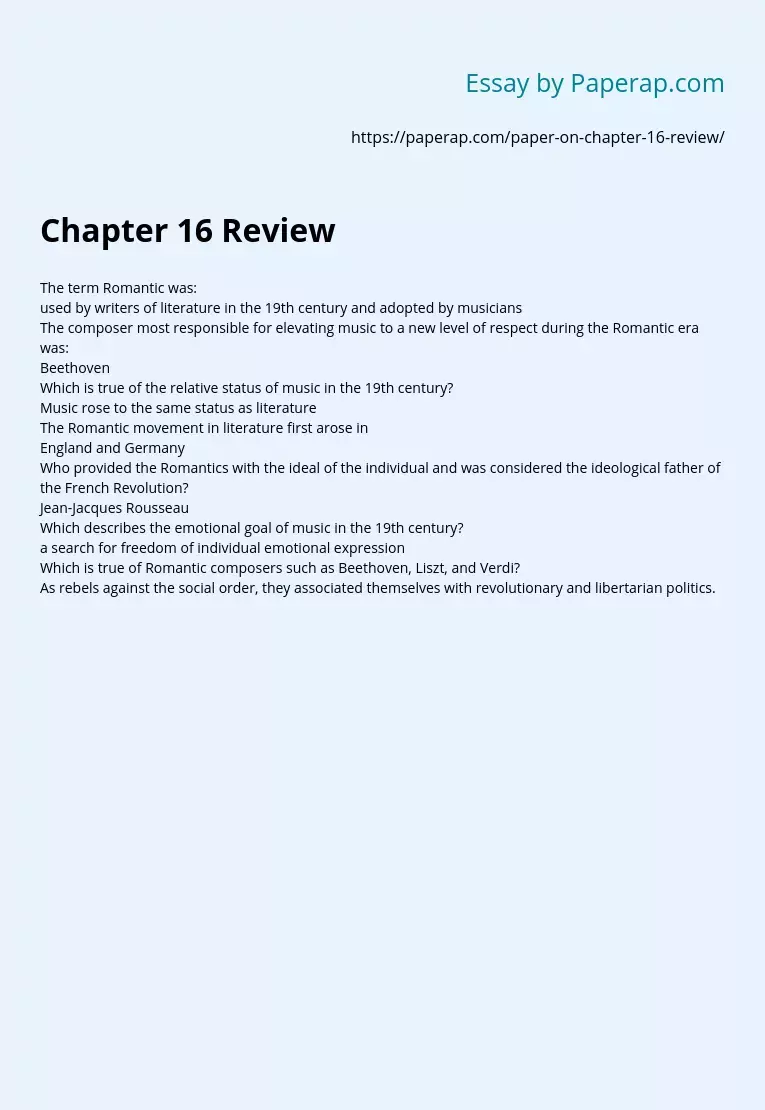Chapter 16 Review
Review,
Pages 3 (566 words)
Views
24
The term Romantic was:
used by writers of literature in the 19th century and adopted by musicians
The composer most responsible for elevating music to a new level of respect during the Romantic era was:
Beethoven
Which is true of the relative status of music in the 19th century?
Music rose to the same status as literature
The Romantic movement in literature first arose in
England and Germany
Who provided the Romantics with the ideal of the individual and was considered the ideological father of the French Revolution?
Jean-Jacques Rousseau
Which describes the emotional goal of music in the 19th century?
a search for freedom of individual emotional expression
Which is true of Romantic composers such as Beethoven, Liszt, and Verdi?
As rebels against the social order, they associated themselves with revolutionary and libertarian politics.
Which is true of the social revolution of the 19th century?
Composers such as Liszt personally crossed class boundaries.
WHich describes Romantic composers’ view of form and harmony?
Romantic composers did not allow form or harmony to restrain spontaneous creativity
An early monument to supernatural Romanticism was the opera The Magic Bullet by:
Carl Maria von Weber
In the 19th century, which of the arts was believed to be most capable of expressing inner experience and emotion?
music
Increasingly, the focal point for the performance of Romantic music was the
concert hall
What musical genres became established on the concert stage by the end of the 19th century?
lieder and string quartets
Which is true of the relationship between Romantic composers and the public?
Nineteenth-century audiences became more conservative and more critical of innovative composers
The composer who started a music magazine to defend music of the Romantics against public indifference was:
Robert Schumann
The quality most prized by Romantic artist was:
the integrity of the expression of individual feeling
The musical term applied to flexibility in rhythm is:
rubato
Which statement is false?
Romantic melodies have more regular phrase lengths than Classical melodies
Which statement is false?
Romantic harmonies were clearer and more diatonic, and they established a stronger sense of tonality than in earlier musical periods
What is chromaticism
using all twelve notes of the scale liberally
In which stylistic period was chromaticism used the most?
Romantic
Romantic treatment of tone color included:
combining and blending different instrumental tone colors in innovative ways
Compared to the Classical orchestra, the typical Romantic orchestra was:
larger and blended tone colors in new ways
The important new member of the Romantic orchestra was:
the conductor
In 19th century opera, the orchestra:
increased in importance, sometimes providing special effects and overshadowing the voices
Music without singing but derived from a poem, story, or other literary source is
program music
Romantic treatment of form
free and spontaneous
Miniatures were usually written for
voice and piano, or piano alone
Miniatures were generally heard:
as separate compositions
Miniatures were given all of the following titles except:
formal titles such as sonata or rondo
In composing Romantic “grandiose” composition, composers created works with
more movements and increased performing forces
Thematic unity occurs when:
a composer uses the same themes in all movements of a work
The technique of having the same theme fragment appear with some sort of variation at loosely recurring intervals is:
thematic transformation
All of the following are characteristics of thematic unity in Romantic symphony music EXCEPT:
using the same themes in several symphonies
Chapter 16 Review. (2018, Jan 23). Retrieved from https://paperap.com/paper-on-chapter-16-review/
